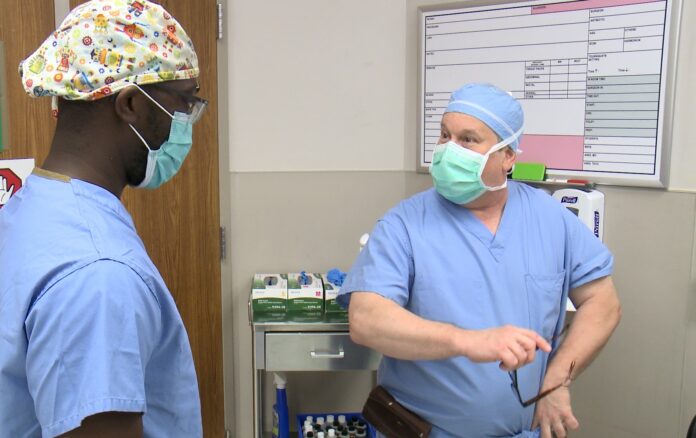LewisGale Medical Center has announced that for the first time in Southwest Virginia, a robotic esophagectomy has been successfully performed at its facility. Requiring a highly specialized multidisciplinary care team, Dominique Dempah, MD, general surgeon, and James Taylor, DO, cardiothoracic surgeon, together performed the advanced surgery resulting in smaller incisions, less pain, and a quicker recovery for the patient.
A traditional esophagectomy is often performed on patients with esophageal cancer. The surgeon makes an incision from the patient’s breastbone to their bellybutton, removes the esophagus, and reconstructs a pathway for food using a portion of the patient’s stomach or large intestine.
The minimally invasive, robotic esophagectomy is performed with state-of-the-art technology enabling surgeons to perform delicate and complex operations. The robotic esophagectomy uses small incisions in the patient’s abdomen and chest. Afterwards, the surgeons use instruments to guide the robotic arms to the esophagus for its removal. They are able to completely dissect the thoracic esophagus with four small incisions, allowing it to be successfully separated from the pericardium, the airway, the aorta, and the thoracic duct.
“The robot enables me to achieve better visualization offering better control and precise operation,” said Dr. Dempah. “Additionally, the robotic surgery decreases the number of incisions required to perform the procedure, resulting in less pain for the patient and their faster return to normal activities.”
LewisGale Medical Center is the only hospital in Southwest Virginia that offers a completely robotic minimally invasive esophagectomy, alleviating the burden of time and cost of travel for patients in the region.
“Robotic surgery is one of the latest advances in esophageal cancer treatment,” said Dr. Taylor. “In addition to less pain and a shorter hospital stay, robotic surgery offers a reduced likelihood of infection, fewer cardiopulmonary complications, decreased blood loss, and less scarring.”


